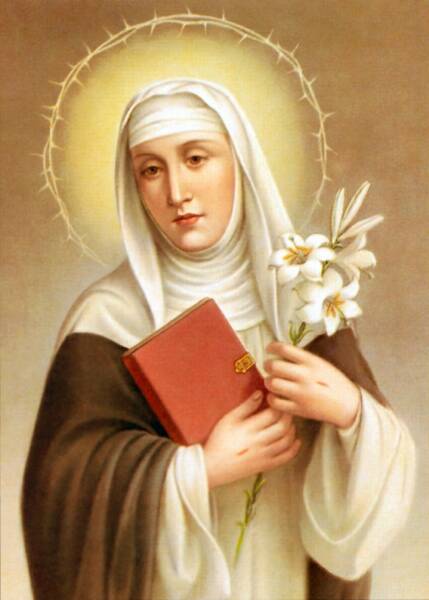Center for Catholic Education at UD

Catholic "Herstory:" St. Catherine of Siena
By Lindsey Bronder
St. Catherine of Siena (1347-80) truly lived out her own words: “If you are what you should be, you will set the whole world ablaze!” Although women of her time were believed inferior to their male peers, St. Catherine in 1376 bravely journeyed to directly confront Pope Gregory XI and persuaded him to return from Avignon, France to live in the Vatican in Rome. She similarly pushed for reform of the Church and also provided spiritual guidance for others throughout her life. For her work and her unique insights, St. Catherine was named a Doctor of the Church by Pope Paul VI in 1970. St. Catherine along with St. Teresa of Avila, St. Therese of Lisieux, and St. Hildegard of Bingen are the only female Doctors of the Church. While these women all significantly contributed to the Christian faith, unfortunately not many Christians are familiar with their lives and their works.
Prior to taking UD’s “Women in the Christian Tradition” course this past semester, I was unfamiliar with these female doctors as well as the works and influence of so many other female saints and Christian women. For my teacher Christine Dalessio, “An essential part of Catholic education is educating on the dignity and value of the human person, which includes male and female.” Dalessio believes that “It doesn’t make sense when God made male and female in His image to have God only mediated through half of humanity.” Furthermore, Dalessio notes that it is important to emphasize women because “The Catholic faith does not survive without women.” In this way, having courses that focus specifically on women are a balance to the abundant courses that primarily focus on men and their works. As a woman, I found this course to be important in my vocation process and understanding how we as women can play a significant role in our faith. I believe it is necessary to include the study of women in the Christian tradition in Catholic schools to provide girls with strong role models of faith and to change how women perceive themselves in the context of faith.
In her first “Women in the Christian Tradition” course, only 7 of Dalessio’s 33 students were women and the rest were men. For Dalessio, this speaks to how this course is important for men too, because they can realize something more about their faith. While it is important to empower girls, there is also a need for understanding and receptive male leadership, including Church leaders, fathers, husbands, brothers, etc. The study of women in the Christian tradition can greatly help to change how women are perceived in the context of faith. Just as how life should reflect an equality, ideally all courses should be integrated and reflect an equality, but this is not always the case. In the Characteristics of Marianist Education, the Marianists outline how they “[join] with women all over the world in their continuing struggle for equal human rights” (CME p. 57). Just as UD, as a Marianist institution, is committed to promoting gender equality in their education, so too should other Catholic schools commit to promoting this equality by including and emphasizing the study of women in the Christian tradition and even offering courses that focus specifically on women.
St. Catherine of Siena, pray for us!
Special thanks for the insight of teaching assistant Christine Dalessio, M.A. and doctoral candidate.
Edited by: Barb Miller and Ben Swick
